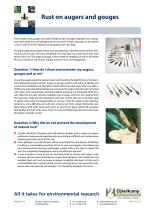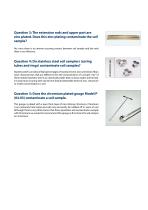
Estratti del catalogo

Rust on augers and gouges These augers and gouges are made of high tensile-strength forgeable iron-manganese steel. Both iron and manganese are non-toxic metals, abundant in the earth’s crust on which we live. Natural concentrations are very high. During storage and transport some rust may develop on the bare metal surface. During first use this rust will scour off quickly. You may also scour with some wet sand prior to first use. The auger or gouge is then ready for sampling of soil on all metals like zinc, cadmium, chromium, copper and even iron and manganese! Question 1: How do I clean and maintain my augers; gouges and so on? In practice augers keep themselves clean (and sharp) by the high friction of soil particles rubbing the augers surface. Augers or gouges used in acid, saline or alkaline soil are prone to oxidation and should be rinsed with pH neutral water after use. After a drilling in an oil-polluted borehole you may clean the auger with a brush in a bucket with water with neutral baby-shampoo added. Spraying our detergent 20.05.29 is very effective too and will also mobilize trace-metals, even the zinc plating from the extension rods! Use this detergent with care or limit the use to stainless steel or plastic tools only. Isopropylalcohol on a tissue is fine for rapid on-site cleaning. Acetone is more effective and will even remove tars from metals. Dismantle coupling sleeves and other loose parts prior to cleaning to allow rapid and complete drying after the final water rinse. Store in a well ventilated area free from dust and, for plastic materials, smells. Question 2: Why did we not prevent the development of natural rust? A paint will blister off quickly and will pollute samples with a variety of organic pollutants during a prolonged period, necessitating a difficult and cumbersome cleaning procedure prior to first use. A zinc plating is very soft. The zinc will be scratched off in a few dozens of drillings resulting in measurable quantities of zinc in your soil samples and influencing your measurements during a prolonged period. After a few days or weeks the zinc has completely disappeared and is not effective anymore. A wax or grease is easy to put on, but fairly hard to remove and, again, risky. Greases, oils and waxes will influence a gas chromatogram (GC) made from soil samples taken with such an auger or gouge. In addition the layer is sticky and it is unavoidable that it will spread all over in carrying bag or case, extension rods, gloves and consequently soil samples. This should be avoided at all times. All it takes for environmental research © May 2014
Aprire il catalogo a pagina 1
Question 3: The extension rods and upper part are zinc plated. Does this zinc plating contaminate the soil sample? No, since there is no intense scouring contact between soil sample and the rods there is no influence. Question 4: Do stainless steel soil samplers (coring tubes and rings) contaminate soil samples? Stainless steel is an alloy of high percentages of mainly chrome, iron and nickel. Alloys have characteristics that are different from the characteristics of a simple “mix” of these metals! Stainless steel is so chemically stable that no loose oxides are formed. It is also hard;...
Aprire il catalogo a pagina 2Tutti i cataloghi e le schede tecniche Eijkelkamp
-
Bi-partite gouge auger model P
5 Pagine
-
Gouge auger set for top layers
4 Pagine
-
Bi-partite root auger set
8 Pagine
-
Wardenaar peat profile sampler
8 Pagine





